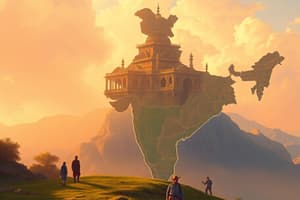Podcast
Questions and Answers
What are the geographical features of India?
What are the geographical features of India?
Himalaya mountains, Hindu Kush mountains, Bay of Bengal, Arabian Sea, Indus river, Indian ocean, Northern Plain, Ganges river, Deccan Plateau.
Why is India considered a subcontinent?
Why is India considered a subcontinent?
Because the Himalaya and Hindu Kush mountains isolate India from the rest of Asia.
How many seasons does India have? Describe them.
How many seasons does India have? Describe them.
India has three seasons: a cool dry season from November to February, a hot dry season from March to May, and a hot rainy season from June to October.
How many climates are found in India? Describe them.
How many climates are found in India? Describe them.
What did the Indus and Ganges rivers do for India?
What did the Indus and Ganges rivers do for India?
What was India's main staple crop?
What was India's main staple crop?
What animals were domesticated in India and how were they used?
What animals were domesticated in India and how were they used?
What other crops were grown in India?
What other crops were grown in India?
How did they water their crops in India?
How did they water their crops in India?
What sophisticated planting method did India use? What did this do for their crops?
What sophisticated planting method did India use? What did this do for their crops?
What was/is sacred and not eaten in India?
What was/is sacred and not eaten in India?
What was/is the main diet of India?
What was/is the main diet of India?
What does India grow which helps them flavor food?
What does India grow which helps them flavor food?
What features acted as barriers/protection for the people of India? How?
What features acted as barriers/protection for the people of India? How?
Flashcards are hidden until you start studying
Study Notes
Geographical Features of India
- Major geographical features include the Himalayas, Hindu Kush mountains, Bay of Bengal, Arabian Sea, Indus River, Indian Ocean, Northern Plain, Ganges River, and Deccan Plateau.
India's Subcontinent Status
- The isolation of India from the rest of Asia is due to the Himalayas and Hindu Kush mountains, justifying its classification as a subcontinent.
Seasons in India
- India experiences three distinct seasons:
- Cool, dry season from November to February
- Hot, dry season from March to May
- Hot rainy season from June to October
Climates of India
- India has five climate types:
- Tropical rainforest: hot and rainy year-round
- Savanna: grassland with sparse trees
- Desert: hot and arid
- Steppe: flat land with short grass, no trees
- Vertical: high-elevation mountainous climates with cold temperatures
Indus and Ganges Rivers
- Ganges River sediment enriches the Northern Plains, making them among the most fertile farmland globally, but seasonal flooding poses a threat to crops.
- Indus River carries sediment from Hindu Kush mountains, supporting diverse aquatic life that is essential for local livelihoods.
Staple Crops
- Rice serves as India's primary staple crop.
Domesticated Animals
- Common domesticated animals include cattle, buffalo, and sheep, primarily utilized for fertilizer rather than meat.
Other Crops
- Agricultural diversity includes wheat, barley, sugarcane, sesame, spices, cotton, along with various fruits and vegetables like mangoes, peas, beans, lentils, and gourds.
Irrigation Practices
- Historically, irrigation techniques have been employed by farmers to provide water to crops during dry seasons.
Planting Methods
- Crop rotation practices were utilized to maintain soil fertility by allowing fields to lie fallow for a season.
Dietary Restrictions and Practices
- Hindus and Buddhists avoid beef, while Muslims can eat all meats excluding pork. Cows and pigs are considered sacred and not consumed.
- A significant portion of the Indian population are vegetarians, with some following vegan diets.
Flavoring Agents
- India cultivates various spices including ginger, garlic, turmeric, cinnamon, and cumin to enhance food flavors.
Natural Barriers
- Mountain ranges serve as natural barriers, isolating India and protecting it from invaders due to harsh climbing conditions.
- Deserts also act as barriers due to their inhospitable environment and extreme temperatures, making them difficult to traverse.
Studying That Suits You
Use AI to generate personalized quizzes and flashcards to suit your learning preferences.




